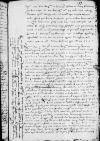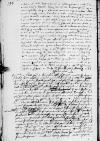Cui quibus me verbis aut modis excusem, quod copiosis et humanissimis ⌊⌋ hucusque non responderim, non invenio. Ceterum pro sua in me benevolentia hanc duntaxat ut unam admittat excusationem, summopere oro: statueram vocatus a ⌊serenissimo domino meo⌋ ad ⌊comitia Regni⌋ ⌊Cracoviam⌋ copiose de multis ad Dominationem Vestram Reverendissimam scribere, utpote eo in loco factus Dominationi Vestrae Reverendissimae propinquior, verum hoc meum institutum innumerae occupationes, in quibus perpetuo fatigatus vix respirare licebat,
{me} sine intermissione impediebant. Vidi quidem ⌊magnificum dominum Lascum⌋[1] cum eoque congressus sum aliquoties, rogitans multa super Dominatione Vestra Reverendissima, qui mihi omnia et optima et honestissima narrabat, meque iis non parum exhilaravit, ut qui nemini cedo in favore et propensione erga Dominationem Vestram Reverendissimam, quantoque aegrius ac molestius tulerim, quod adeo male Dominatio Vestra Reverendissima et ab adversa valetudine, et ab hominibus in ⌊Varadino⌋ fuit tractata, tanto mihi erat gratius Dominationem Vestram Reverendissimam recte valere et habere in omnibus felicius. De litteris equidem Dominationis Vestrae Reverendissimae, quas in praesentiarum ad manus non habeo, nihil est, quod tenacius memini, quam quod mihi scripsit de ⌊maiestate caesarea⌋, quae eo tempore, quo apud illam Dominatio Vestra Reverendissima fuerat, tot habebat dispensandi, ut vocant, mercedes, de quibus pro tot servitiis et benemeritis sibi nihil cessisse Dominatio Vestra Reverendissima querebatur. Non potui profecto summopere non condolere Dominationi Vestrae Reverendissimae tam diu fortunam cum Dominatione Vestra Reverendissima novercari, spes tamen me firma tenet et solatium, quod propediem tot animi dotibus innumerisque virtutibus Dominationis Vestrae Reverendissimae id exigentibus
cf. Tac. Ann. 12. 2 novercalibus odiis; Adagia 1526 No. 1195 Odium novercale ⌊novercale odiumcf. Tac. Ann. 12. 2 novercalibus odiis; Adagia 1526 No. 1195 Odium novercale ⌋ deponens
cf. Hor. S. 2. 6. 49 fortunae filius ⌊fors fortuna pia fiet matercf. Hor. S. 2. 6. 49 fortunae filius ⌋. In quo omnino nihil ambigo, omniaque fausta et felicissima Dominationi Vestrae Reverendissimae et faveo et precor ex animo. Quod hinc de rebus novis scribam, non habeo, quam quod ⌊dux ⌊Holsaciae⌋⌋ ⌊Regno Daniae⌋ potitus saevire coepit in episcopos[2], quorum aliquot fertur tenere captivos. Quid adhuc ex ista nascetur tragoedia, cum concilium praepeditur[3] iis iniquis temporibus et hominibus adversantibus,
in dubio est. Dominus Deus misereatur nostri, ecclesiamque suam a malorum hominum conatibus tueatur et defendat. Hoccine, hoc est esse ⌊Christianissimum⌋[4] aperte sentire cum infidelibus, eosque in Christianos animare atque concitare?
cf. Vulg. Ps CLI 7. 12 Deus iudex iustus et fortis et patiens; Vulg. Ps (H) 7. 12 Deus iudex iustus et fortis comminans tota die; Vulg. Ps CLI 73. 13-14 contribulasti capita draconum in aquis / tu confregisti capita draconis; Vulg. Ps (H) 73. 13-14 contrivisti capita draconum in aquis / tu confregisti capita Leviathan ⌊Deus nimirum ⌊⌋, moliminaque gregi suo noxia et capita draconum confringetcf. Vulg. Ps CLI 7. 12 Deus iudex iustus et fortis et patiens; Vulg. Ps (H) 7. 12 Deus iudex iustus et fortis comminans tota die; Vulg. Ps CLI 73. 13-14 contribulasti capita draconum in aquis / tu confregisti capita draconis; Vulg. Ps (H) 73. 13-14 contrivisti capita draconum in aquis / tu confregisti capita Leviathan ⌋. Scripsi has adiunctas communi nostro amico magnifico domino ⌊Cornelio Sceppero⌋, et cum postae semper sint apud vos in ⌊Brabanciam⌋, impense rogo, velit efficere, ut ad eum perferantur. Hinc tam facile, cum nondum navigari coeptum sit, eam mittendi <non> habemus commoditatem. Vix quicquam aliud, quam quod me adhuc in vivis esse sciat, scribo, notumque ei facio, similiter et Dominationi Vestrae Reverendissimae, me paulo ante factum esse coadiutorem Varmiensem. In
manu Dei est, quamvis aetate non modica adversaque valetudine ⌊pius et bonus pater episcopus Varmiensis⌋ semper afficiatur, quem prius divina Maiestas vocare dignabitur. Haec sic cum fraterna excusatione in notitiam Dominationis Vestrae
Reverendissimae deducenda existimavi, quam plurimum oro me eo amore et
benevolentia, quam ex me cognovit semper et quo me vicissim Dominatio Vestra Reverendissima prosecuta est, prosequi non desinat, meque de statu rebusque suis, quae mihi non secus atque Dominationi Vestrae Reverendissimae curae sunt, aliquando certiorem reddat. Miseram carissimo olim communi amico nostro ⌊⌋ supra eius sepulcrum ⌊Viennam⌋, quod si est appensum seu affixum nec ne, ut mihi significet, rogo. Dominus Deus eandem Dominationem Vestram Reverendissimam quam diutissime sospitet et prosperet in omnibus.
[1 ] At the 1536/37 Diet Hieronim Łaski was an envoy of king of Rome Ferdinand Habsburg, so he doubtless had fresh news from Weze who was in Hungary
[2 ] In October 1536 king of Denmark Christian III imprisoned the Danish and Norwegian bishops (cf.
cf. MAŁŁEK 1969 Przyczynek p.130-131 ⌊Małłek,1969, p.130-131cf. MAŁŁEK 1969 Przyczynek p.130-131 ⌋); Dantiscus was asked to plead for the imprisoned bishops with the Polish king by bishops Ioannes Magnus, Hans Brask and Magnus Haraldsson, who had been exiled from Sweden and were staying in Gdańsk (cf. ⌊⌋)
[3 ] The General Council (of ⌊Trent⌋) was ultimately convened in 1545
[4 ] French kings traditionally used the title “arch-Christian” (Christianissimus). This title was part of the formula pronounced during the monarch’s anointment, after which he became the Lord’s anointed. Next to the coronation, the anointment was the most important part of a new ruler’s investiture. From about the 9th century in France, it gained a very special meaning because French kings, apart from the usual chrism, were anointed with balm from the Holy Ampulla, which according to tradition had been brought to St. Remigius by a dove so that he could anoint Chlodvig during his baptism. The anointment ceremony involved pronouncing the formula “Blessed are you, hail who comes in the name of the Lord – to accept the holy anointment with the divine oil sent by the Creator to the arch-Christian king of France and no other.” This tradition gave rise to the belief in the special role of French kings in the Church. It formed the foundation for the development of Gallicanism (cf. e.g. Roux, p. 237-239). Here, Dantiscus emphasizes the conflict between Francis I’s alliance with the Turkish sultan against the empire, dictated by the existing political situation, and the idea of uniting Christian Europe to fight against the infidels which was deeply rooted in tradition

